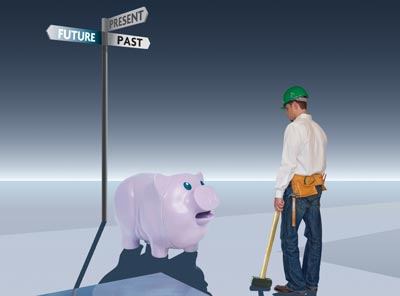When Tim Colon restructured his business in 2008, it was done with an eye toward the future.
In addition to streamlining operations, the president of Pools of Fun in Plainfield, Ind., identified potential growth opportunities.
“We’re investing right now to increase our business and gain market share,” Colon says. “I had to make the tough decisions along the way, but today we’re in position to take advantage of opportunities in the near future.
“Other companies that didn’t position themselves as well are now in a live-or-die situation, which is a very short-term way of looking at your business,” he adds.
Colon isn’t alone. Despite a sluggish economy, a number of the nation’s largest pool builders continue to invest in their businesses. The theory follows that investment speaks to a company’s strength and stability, and sends a positive message to employees as well as clients.
But not all strategies are created equal. Some top builders have opted for a more conservative approach to navigating the recession, holding off on new acquisitions or investments until healthier profit margins return.
Here, some of the country’s leading pool builders explain how they’re positioned for future success, whether they follow an aggressive or more restrained philosophy on investment, and what ultimately those decisions say about their companies.
Stepping out
Pools of Fun had always been one of the Midwest’s better-known vinyl-liner and fiberglass pool dealers. But when the local economy bottomed out in 2008, Colon began looking at new revenue streams.
First, he diversified his company’s residential product lines, bringing more freeform and concrete-bottom pool options to the portfolio.
“That’s an area in which we had not been heavily involved in the past,” Colon says. “But I know that when the economy starts to turn loose, we will have established ourselves as a viable option against our competitors —and we’ll just ride that wave upward.”
Next, Colon decided to extend his company’s reach by opening a sixth retail store in Greenfield, Ind., about 20 miles east of Indianapolis. The area was just beginning a population surge thanks to an influx of local businesses, and the territory was one the firm’s existing five locations hadn’t significantly penetrated.
“I saw an opportunity there that I could not pass up — there was going to be some growth in that area in the next two to three years,” he says of the 2009 addition. “Will it make us a lot of money right at this moment? Probably not. But I know the opportunity is there. … It’s coming to fruition.”
Recent forays into new markets have proven profitable for Cody Pools as well. In 2008, CEO Mike Church decided to expand his Austin, Texas-based company’s operations into nearby San Antonio. For two years the company had run a small satellite office there with little more than a design team.
The decision paid dividends, and in 2010 Church opened a larger facility on the west side of San Antonio that houses the area’s sales, construction and service offices.
“We expanded because the San Antonio market has been very good for us — we’ve gained more market share in that area,” he says. “We even increased our advertising budget for San Antonio, and we’re seeing it pay off this year.”
The coming years could see Cody pursue further expansion, Church says, with Dallas being mentioned among possible targets. Though farther than the 90 miles that separate Austin from San Antonio, Dallas’ possibilities could more than make up for the challenges of managing a market three hours away, he explains.
Thousands of miles away in Northern California, Paul Porter has discovered the treasures of Texas as well. The president of Premier Pools and Spas , based in Rancho Cordova, Calif., recently signed a licensee in the Houston market, marking his firm’s push to begin licensing branches across the country.
Licensees are entitled to Premier’s branding, buying power, advertising, sales training, and legal, human resources and accounting services in exchange for paying the company a percentage of their earnings.
“I feel like a lot of people will be interested in a licensing model,” Porter says. “It’s tough being the lone ranger these days. So we’ve invested in software, licensing, marketing — our whole philosophy was to use the downturn to capture market share. We want to be in better shape coming out of this.”
Also growing geographically is West Covina, Calif.-based California Pools . CEO Ryder Steimle has partnered with new licensees to open a location in San Luis Obispo, Calif. And he hopes this expansion will spearhead further forays throughout Northern California.
Playing it safe
Bob Spero would love to enhance his company’s computers and CAD programs.
But the vice president and co-owner of Maryland Pools in Columbia, Md., isn’t investing in new software right now.
“We’re fairly ahead of the curve already,” he says, “so we’re able to use the technologies that we do have to allow us to get by in a downturn. We’re not cutting back, we just haven’t pursued the upgrades we would in a normal year. And we don’t want to regress, that’s for sure.”
It’s a simple matter of economics, Spero explains. While his company believes in maintaining pricing and margins through a downturn, his competitors have not held the line, he says. Therefore, retaining employees and ensuring cash flow have taken precedence.
“Everything’s contingent upon what happens in the present, as far as what we can do in the future,” Spero says. “We certainly have plans to expand every phase of the business, but we need to get out of this downturn first.”
For Keith Zars, the top priority is making sure he stays in business. And that means looking after his 225 employees. He’s become painstaking about eliminating errors wherever possible, and he now signs every check that leaves his office. (“I need to see what I’m buying and where I’m buying it from,” he says.)
The owner of Keith Zars Pools , based in San Antonio, still bought four trucks this year, “but in a good year I’d buy 12,” he says. Holding back on most capital purchases has become a necessary exercise in restraint, he says, when running out of cash simply isn’t an option.
“That’s kind of the way we’re running our business right now because we want to make sure we stay in business,” Zars says. “In this market here, every pool builder is still vulnerable. If we weren’t vulnerable, we would be doing more. But I owe it to my employees to stay in business. That’s the most important thing. You don’t have a choice in that.
“There’s no need to invest in some new item unless you’re pretty sure you’re going to get your money back out of it fairly quickly,” he adds.
The right message
Whether the strategy is expand or maintain, company heads believe the underlying message of any investment approach should be one of stability and security.
At Barrington Pools in Barrington, Ill., owner and CEO Dale Overson has made small investments over the past year — mainly in the areas of equipment and technology.
But he’s held off on major capital purchases, and his prices have remained at 2008 levels. If he could, he’d invest in additional sales training for his employees. Still, he’s confident his team has faith in their leadership.
“I think the employees feel comfortable in their jobs,” Overson says. “We’re not putting any added pressure on them, and we’re not cutting their pay. I think they appreciate that.”
Though armed with a different philosophy, Cody Pools ’ Church too believes his employees pick up on the optimism that pervades his company’s outlook. And, he says, it usually filters down to the consumer.
“Employees feel the stability,” Church says. “They see us maintaining and they see the end results of our sales, so the attitude is very positive here. We’ve expanded, so the employees have confidence in what we’re doing.
“And if we’re expanding where everyone else is cutting back, it has to tell the consumer that we’re doing something right,” he adds. “We’re not trying to overextend ourselves — we’re managing our expansions. And we’re gaining market share. The customers feel it when the sales team is out talking to them, and I know it helps us get business.”


